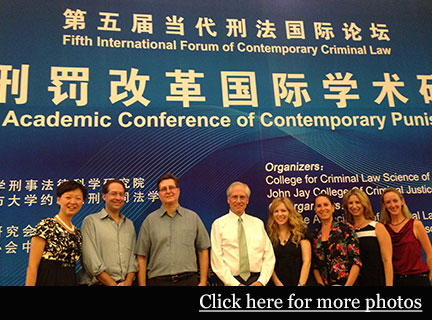Newsroom Archive
President Jeremy Travis and eight members of John Jay College faculty attended the Fifth International Forum on Contemporary Criminal Law: Contemporary Punishment Reform co-hosted by John Jay College and Beijing Normal University in Beijing, China, from August 17-18.
The conference is a product of the alliance between the two institutions to cultivate collaboration, programs and an exchange of ideas and research among faculty and students. The relationship was formalized last year with the signing of a Memorandum of Understanding by President Travis and representatives from Beijing Normal University. This partnership is supported by an Open Society Foundation (OSF) grant that helps John Jay develop partnerships with educational institutions in China, specifically Public Security University and Beijing Normal University, to advance criminal justice education reform. These partnerships include faculty and student exchanges, joint conferences, and translation of key criminal justice texts into Chinese.
This year’s international conference was devoted to contemporary punishment reform and to challenging and redefining conventional theories and practices surrounding criminal punishment and law. Areas discussed throughout the conference’s lectures and workshops included severity of criminal sanctions, the death penalty, and the role of community corrections, prisoner reentry programs, and support of victims of crimes.
“The purpose of this grant is to begin discussion on criminal justice reform in China,” said Professor Karen Terry of the Department of Criminal Justice, who is Principal Investigator of the OSF grant and acted as administrator for the conference. “This conference was one component of that. The talks our faculty gave were very well received. We presented many new concepts that others had not heard about or implemented yet. Our faculty has such a depth and breadth of expertise related to crime and justice, we can play a significant role in these issues related to criminal justice reform in China. It’s very exciting to have a significant influence in how criminal justice policy develops in China.”
President Travis delivered one of the keynote addresses, titled “Returning Home: Understanding the Challenges of Prisoner Reentry and Reintegration.”
Faculty members presenting papers at the conference included:
Joshua Freilich (Criminal Justice) and Amy Adamczyk (Sociology), “Disorganization, Diversity and Deadly Far-Right Ideological Far Right Violence: A County Level Analysis”;
Debbie Koetzle (Public Management), “Making Drug Courts More Affective: Lessons from Literature”:
Richard Li (Science), “A Case Study of the Application of DNA Evidence to Avert Justice”;
Baz Dreisinger (English), “Education Inside Outside: Communities, Corrections and the Prison to College Pipeline”;
Mike Fondacaro (Psychology), “The Death of Retribution: Behavioral and Neuroscience in Pursuit of Justice.”
“I think the conference was very successful,” said Terry. “There have been recent criminal law reforms in China, and the discussion around criminal justice policy was much more open than it has been in the past, as scholars in China are thinking more progressively than they have in the past.”
 Inside JJC (Faculty & Staff)
Inside JJC (Faculty & Staff) Technology Services Status
Technology Services Status


